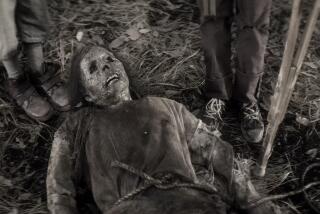A Taste of the Bizarre From Mexico : Movies: UCLA Film Archive schedules a series of works by Arturo Ripstein and Jaime Humberto Hermosillo.
- Share via
The UCLA Film Archive, the primary film programmer for the Los Angeles Festival, launches Saturday in Melnitz Theater “The Films of Arturo Ripstein and Jaime Humberto Hermosillo.” Not only is the archive repeating films shown in the L.A. Festival, but adding many more by two of Mexico’s finest directors. The influence of Luis Bunuel, long in Mexican exile, is probably inescapable for serious Mexican directors, yet Ripstein and Hermosillo have developed their own distinctive personalities while sharing with the Spanish master a taste for the bizarre and darkly humorous.
Ironically, Ripstein first came to attention with “The Castle of Purity” (1972), which screens Saturday at 7:30 p.m., a film so off-putting that his subsequent achievements have come as a surprise. An allegory of relentless morbidity and tedium from a story by Octavio Paz, it stars Claudio Brook as a rat-poison manufacturer so disenchanted with the world that he attempts to seal it off entirely from his family, who when we meet them have been sequestered in their crumbling mansion for 18 years.
By 1978, however, Ripstein came up with a vastly more impressive and imaginative fable, “A Place Without Limits” (screening Sunday at 7:30 p.m.). Spanning two generations of life in a seedy village falling increasingly into the grasp of an elderly politico, it tells of a drag-queen flamenco dancer (Roberto Cobo, who is remarkable with his sinewy physique at poignant odds with his effeminate mannerisms) seduced by the local madam (Ana Martin) on a bet in order that she win ownership of her bordello--and of Cobo’s later brave act of self-sacrifice to protect their beautiful daughter (Lucha Villa).
The film emerges as an all-out attack on machismo , suggesting that it can often mask in a man a highly insecure sense of masculinity. “A Place Without Limits” is “La Cage aux Folles” played for tragedy; it has been reported that Manuel Puig contributed to the script without credit.
Best known for “Dona Herlinda and Her Son,” which has been called the first Mexican film to deal openly with homosexuality, Hermosillo is captivated by dominance and submission within relationships of people of bourgeois propriety. Subtle, languorous and sly, Hermosillo’s 1974 “The Dog’s Birthday,” screening Sunday after a 2 p.m. presentation of Ripstein’s “Time to Die,” gradually reveals the full and unexpected impact upon a prosperous middle-aged tailor (Jorge Martinez de Hoyos) of the murder of a beautiful young woman (Diana Bracho) whose husband (Hector Bonilla), a handsome champion swimmer, was once in the tailor’s employ. Hermosillo holds his cards until the last moment and then delivers a grand slam.
If you missed “Passion According to Bereneice” (1975), one of Hermosillo’s best films, you will have another chance to see it when it screens Saturday following “The Castle of Purity.” Hermosillo gracefully sets up a volatile attraction between a repressed young widow (Martha Navarro), her beauty scarcely marred by an intriguing scar, and a dashing young doctor (Pedro Armendariz Jr.). Full schedule and information: (213) 206-FILM, 206-8013.
More to Read
Only good movies
Get the Indie Focus newsletter, Mark Olsen's weekly guide to the world of cinema.
You may occasionally receive promotional content from the Los Angeles Times.










